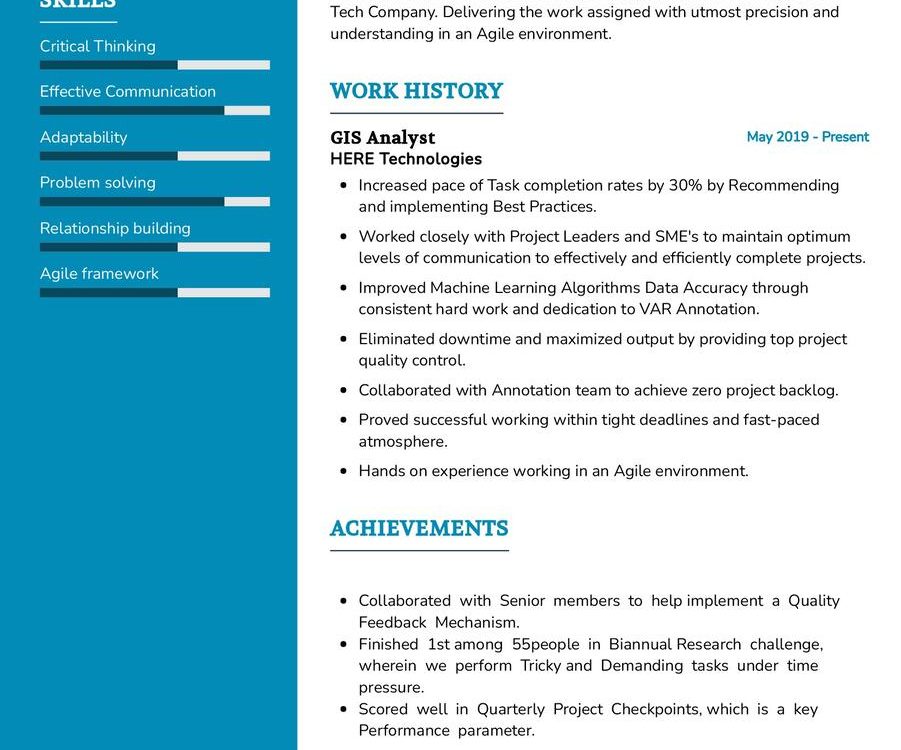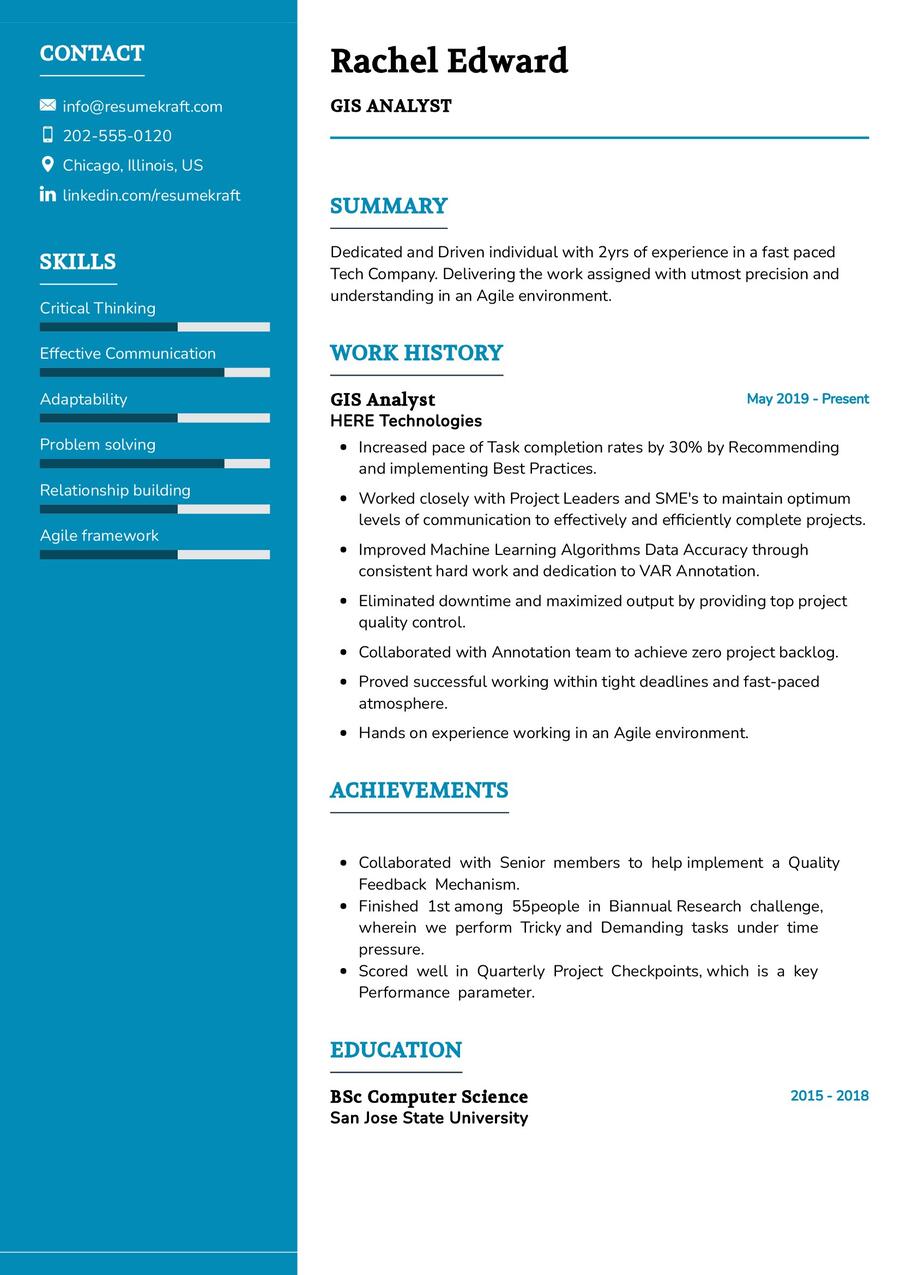Exploring the Role of a GIS Analyst
As the digital landscape continues to evolve, the demand for skilled Geographic Information System (GIS) Analysts has risen significantly. The position of a GIS Analyst is at the intersection of technology and geography, making it a dynamic and vital role in various industries. In this comprehensive guide, we will delve into the multifaceted role of a GIS Analyst, the essential requirements for the job, key responsibilities, and valuable tips for crafting an impressive GIS Analyst CV.
GIS Analyst Job Requirements
Embarking on a career as a GIS Analyst requires a specific skill set and educational background. Let’s explore the fundamental requirements to step into this exciting role:
- A Bachelor’s or Master’s degree in Geography, Geographic Information Systems, or a related field, showcasing a solid foundation in geographical principles.
- Proficiency in GIS software such as ArcGIS, QGIS, or similar platforms, with hands-on experience in spatial analysis and mapping.
- Strong analytical skills and attention to detail, essential for interpreting complex geographical data and providing accurate insights.
- Programming skills, especially in languages like Python or R, to automate GIS processes and enhance data visualization.
- Effective communication skills, as GIS Analysts often collaborate with cross-functional teams to gather requirements and present findings.
- Experience in data management, including the ability to collect, clean, and organize spatial data efficiently.
- Understanding of remote sensing technologies and their application in GIS projects.
Continued professional development, such as obtaining GIS certifications, can further enhance your profile in the competitive job market.
Responsibilities of a GIS Analyst
The role of a GIS Analyst is diverse and involves working on various projects that leverage geographical data. Let’s unravel the core responsibilities that define this role:
- Collecting, interpreting, and analyzing spatial data to provide actionable insights for decision-making.
- Creating and maintaining GIS databases, ensuring data accuracy and integrity.
- Developing maps and visualizations to communicate complex spatial information effectively.
- Collaborating with different departments to understand their spatial data needs and tailor GIS solutions accordingly.
- Applying geostatistical methods to analyze patterns and trends in geographical data.
- Conducting quality assurance checks on GIS data and resolving discrepancies.
- Staying updated on the latest advancements in GIS technology and recommending innovative solutions for project improvement.
Each responsibility adds a layer of complexity and learning to your journey as a GIS Analyst.
GIS Analyst CV Writing Tips
Crafting a compelling CV is essential to stand out in the competitive job market. Here are some tips specifically tailored for aspiring GIS Analysts:
- Highlight specific GIS projects you have worked on, detailing the tools and methodologies used and the impact on the organization.
- Showcase your proficiency in GIS software by listing the specific applications and tools you are adept at using.
- Include relevant coursework and projects from your academic experience, emphasizing any hands-on GIS work.
- Quantify your achievements where possible, such as the percentage improvement in data accuracy or the efficiency gained through automation.
- Customize your CV for each application, aligning your skills and experiences with the specific requirements of the job.
Each tip contributes to creating a CV that effectively communicates your skills and experiences as a GIS Analyst.
GIS Analyst CV Summary Examples
Your CV summary is the opening act of your career story, setting the stage for what is to follow. Here are some examples to inspire you:
- “GIS Analyst with a Master’s degree in Geographic Information Systems, skilled in ArcGIS and Python scripting. Successfully led a team in implementing GIS solutions, resulting in a 15% improvement in data accuracy.”
- “Detail-oriented GIS Analyst with hands-on experience in QGIS and a strong background in spatial analysis. Collaborated with cross-functional teams to develop interactive maps, enhancing communication and decision-making processes.”
- “Experienced GIS Analyst specializing in remote sensing technologies and data visualization. Led a project that optimized GIS workflows, reducing processing time by 20%.”
Each summary is a snapshot of your expertise and the value you bring to the role of a GIS Analyst.
Create a Strong Experience Section for Your GIS Analyst CV
Your experience section is the heart of your CV, pulsating with the rich experiences you have gathered over the years. Here are some examples to guide you:
- “Managed the development and maintenance of GIS databases, ensuring data accuracy and accessibility for the entire organization.”
- “Utilized Python scripting to automate spatial analysis processes, increasing efficiency and allowing the team to focus on more complex tasks.”
- “Collaborated with environmental scientists to analyze satellite imagery and provide insights into land cover changes for a conservation project.”
Each experience is a chapter in your career book, narrating tales of challenges met, solutions found, and successes achieved as a GIS Analyst.
Sample Education Section for Your GIS Analyst CV
Your educational journey is the foundation upon which your career stands. It is a testimony to your knowledge, your expertise, and your commitment to learning. Here’s how you can list your educational milestones:
- Master of Science in Geographic Information Systems, XYZ University, a journey of deep learning and specialization, 2019.
- Bachelor of Arts in Geography, ABC University, the foundation stone of your GIS career, 2017.
- GIS Professional Certification, GIS Certification Institute, 2020.
Each educational qualification is a stepping stone, leading you to the pinnacle of success in your career as a GIS Analyst.
GIS Analyst Skills for Your CV
Your skill set is your toolbox, equipped with a diverse range of tools that you have honed over the years. It is a showcase of your abilities, both innate and acquired. Let’s list down the essential skills that a GIS Analyst should possess:
Soft Skills:
- Analytical thinking and problem-solving, the ability to interpret complex geographical data and provide meaningful insights.
- Effective communication, the art of conveying technical information to both technical and non-technical stakeholders.
- Attention to detail, crucial for ensuring data accuracy and precision in GIS projects.
- Team collaboration, as GIS Analysts often work with diverse teams to gather and analyze spatial data.
- Adaptability, the capacity to learn and adapt to new GIS technologies and methodologies.
Hard Skills:
- Proficiency in GIS software such as ArcGIS, QGIS, or similar platforms, essential for spatial analysis and mapping.
- Programming skills in languages like Python or R, vital for automating GIS processes and enhancing data visualization.
- Data management, including the ability to collect, clean, and organize spatial data efficiently.
- Remote sensing technologies, an understanding that enhances the analysis of satellite imagery and other remote sensing data.
- Project management, the ability to plan and execute GIS projects effectively.
Each skill is a tool, aiding you in providing valuable insights and leading GIS projects effectively.
Common Mistakes to Avoid When Writing a GIS Analyst CV
As you craft your CV, it is essential to steer clear of common pitfalls that can hinder your journey to landing your dream GIS Analyst job. Here we list down the mistakes often seen in CVs and how to avoid them:
- Using a generic CV for every application, a strategy that fails to highlight your specific GIS skills and experiences.
- Listing duties without showcasing achievements, a narrative that lacks depth and impact.
- Overlooking the importance of a well-crafted CV summary, a missed opportunity to grab the employer’s attention from the beginning.
- Neglecting to tailor your CV for the specific job, a mistake that can lead to overlooking key requirements mentioned in the job description.
- Failing to proofread, a mistake that can leave a negative impression on potential employers.
Each mistake is a potential roadblock, avoid them to craft a CV that is both authentic and compelling.
Key Takeaways for Your GIS Analyst CV
As we reach the end of this comprehensive guide, let’s recap the key points to keep in mind while crafting your GIS Analyst CV:
- Emphasize your GIS projects and their impact on the organization, showcasing the tools and methodologies used.
- Highlight your proficiency in specific GIS software and programming languages.
- Quantify your achievements where possible, providing tangible evidence of your contributions.
- Include a section on continuous learning, showcasing any GIS certifications or additional coursework undertaken.
Finally, feel free to utilize resources like AI CV Builder, CV Design, CV Samples, CV Examples, CV Skills, CV Help, CV Synonyms, and Job Responsibilities to create a standout application and prepare for the GIS Analyst job interview.
Armed with these insights and tips, you are now ready to craft a CV that is a true reflection of your journey, your skills, and your aspirations as a GIS Analyst. Best of luck!


